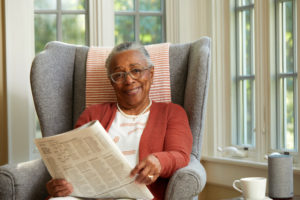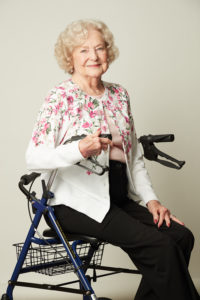An Unwelcome Change
There are certain changes to our skin that we come to expect as we age. Whether it’s looser skin, wrinkles, or spots, it’s often understood that these changes represent part of our body’s natural aging process. Thick, scaly patches, on the other hand, are not as expected. And yet, psoriasis – a condition which causes the body to accelerate skin cell production resulting in scab-like plaques – is noted as the most prevalent autoimmune disease in Canada. The Canadian Dermatology Association reports that there are 1 million Canadians who live with psoriasis. Although it tends to develop in those between the ages of 15 and 35, psoriasis is a lifelong ailment, and it’s especially important that seniors with the condition properly manage it. Doing so will help lead to better overall physical health and greater quality of life.
Genetics play a significant role in psoriasis development. A person is 50% more likely to get psoriasis if both parents have it.
What to Expect with Psoriasis
The scaly patches that begin to develop are only part of the equation when it comes to psoriasis. The condition can also increase the risk of lymphoma, non-melanoma skin cancer, low bone density, and even osteoporosis. What’s more, older adults with psoriasis may often develop psoriatic arthritis, which causes swollen fingers/toes, foot pain, and lower back pain. Because of the numerous risks associated with psoriasis, it’s vital for older adults to see a board-certified dermatologist to better understand the severity of the condition, recognize the triggers (e.g., stress, alcohol consumption, medications, and injury), and to determine the most appropriate treatment plan.
When considering treatment, it’s important to know that it’s not a one-size-fits-all approach. Guidelines from the National Psoriasis Foundation Medical Board recommend that older adults with mild psoriasis use only topical treatments, and for those with severe psoriasis, to receive phototherapy. The latter is often administered by dermatologists 2-3 times a week, using a booth that exposes the patient to either ultraviolet A or B light. Oral/injected medications are also an option, but they tend to have severe side effects,and are often prescribed only for short durations.
Older adults should include all of their doctors and medical care professionals in the conversation before any treatment plan is prescribed. Primary care physicians need to be informed of treatment to ensure that it doesn’t interfere with medications or increase the risk of other health problems.
Steps for Managing Psoriasis
In addition to prescribed treatment, older adults can take steps to manage psoriasis and ease its associated symptoms.
- Check over-the-counter skin care products to ensure they aren’t alcohol-based. Alcohol can irritate the skin further, so choose products that include ceramides, lipids, and hyaluronic acid – natural moisturizers that the body produces less of with age.
- Use a humidifier in the home to help distribute moisture and prevent dry skin.
- Avoid using fragrances, as they can inflame psoriasis.
- With physician/dietician approval, follow a healthy diet that includes cold water fish, omega-3 fatty acids, and nuts. Also, consider adding turmeric to your diet. This natural supplement’s anti-inflammatory properties are known to help reduce psoriasis flare ups.
- Avoid alcohol. Studies have shown that alcohol is a trigger for psoriasis, and frequent consumption can even increase the chances of developing the condition.
- Maintain a healthy weight through exercise and – as noted above – a healthy diet. Doing so will also help to reduce the risk of other psoriasis-related health problems, such as heart disease and diabetes. Remember to consult a physician before beginning any exercise regimen.
- Reduce stress whenever and however possible. Like alcohol, stress is a known psoriasis trigger – but unlike alcohol, stress can be harder to avoid in day-to-day life. To help keep it at bay, consider practicing yoga, meditation, or other activities that can bring a sense of peace.
- Maintain a strong support network. Late-onset psoriasis can lead to feelings of anxiety and depression, so whether it be friends, family, or an actual support group, having people to talk to about the condition can help improve emotional wellbeing.
Comfort Keepers® Can Help
Psoriasis can be very alarming, especially if it develops later in life, and managing it can be demanding on seniors and family caregivers. At Comfort Keepers®, we can help seniors and other adults with psoriasis maintain their health and wellbeing. Our caregivers can help prepare healthy meals, see that they’re taking medications, and assist with physical tasks that may be difficult because of the condition. Learn more about Comfort Keepers’ in-home care services by contacting your local office.
References:
Canadian Dermatology Association. “ Psoriasis” Web. 2018.
SkinCareGuide. “Psoriasis in the Elderly.” Web. 2018.
HealthCentral. “Common Questions about Late-Onset Psoriasis” by Sarah Markel. Web. 2018.
HealthLine. “Psoriasis by the Numbers: Facts, Statistics, and You” by Ann Pietrangelo & reviewed by Debra Sullivan, PhD, MSN, RN, CNE, COI. Web. 2018.
HealthLine. “10 Ways to Treat Psoriasis at Home” by Brian Krans and Cathie Ericson & medically reviewed by Debra Sullivan, PhD, MSN, RN, CNE, COI. Web. 2018.
WebMD. “Aging with Psoriasis” by Camille Noe Pagan. Web. 2018.
 Comfort Keepers is all about Elevating the Human Spirit for clients, caregivers and families. That has never been more important than now. During this time of social distancing, seniors may be socially isolated, in addition to being physically isolated. Comfort Keepers works to help seniors fight depression and loneliness, especially while remaining at home. We help keep them active, optimistic and socially engaged during this period. A daily dose of joy is sorely needed.
Comfort Keepers is all about Elevating the Human Spirit for clients, caregivers and families. That has never been more important than now. During this time of social distancing, seniors may be socially isolated, in addition to being physically isolated. Comfort Keepers works to help seniors fight depression and loneliness, especially while remaining at home. We help keep them active, optimistic and socially engaged during this period. A daily dose of joy is sorely needed.

